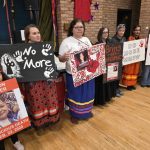Liberal to Progressive
By John Hughes
We live in a time when our country is becoming increasingly conservative, or at least anti-liberal. As I noted in a previous Wayward Son, 40 percent of the citizenry now identify themselves as conservative, versus 19 percent who call themselves liberal. And the reality is so much more than statistical; an acquaintance of mine recently snarled with venom and called me a “tree hugger” when I questioned the legitimacy of the war in Iraq. Have you noticed this sort of militancy in your sphere of associates?
In the 40 years since Lyndon Johnson defeated Barry Goldwater in an overwhelming landslide, it has become unthinkable that a liberal could so soundly defeat a conservative. It has become unthinkable and fodder for rage among the Clear Channel populists that one should even identify oneself as “feminist” or “environmentalist” or “pacifist.” The majority of people in our country are not just conservative, but angry at and full of contempt for liberals. Just listen to WTMJ radio if you need an example.
Things are not getting better for liberals and their issues these days, but increasingly worse. Conservatives are growing more entrenched in their beliefs as their cultural dominance increases. America apparently will be a bastion of militarism, and of commerce untainted by governmental compassion or collective concern about where the free market might take us environmentally or in terms of equitable opportunity. Millions of people feel completely disenfranchised by this movement, but, frankly, don’t see a compelling and engaging alternative.
What do we do about this?
I have several suggestions, but will limit this discussion to one potent idea: that we draw a distinction in our thinking between liberal and progressive, and choose the latter. “Liberal” is now a word so tainted among most Americans that I propose we abandon it, as several of America’s leading thinkers once abandoned “anarchist” as a self-descriptive label. That latter word denoted a distinguished and elegant political posture, historically aligned with workers’ rights. But it began to be associated with fanatics like the Unabomber in the public imagination. Realizing that the storied term would be viewed with suspicion and alarm by most people, the grown-ups within the anarchist movement (like poet and eco-activist Gary Snyder) put the word on the back burner. They soft-pedaled it and opted for new language. This was realpolitik.
To be fair, liberals were forced into their position. During the civil rights era, Southern states were not going to relinquish their segregationist policies unless coerced by the Kennedy and Johnson administrations, and by the Earl Warren-era Supreme Court. When these exigencies abated, the power remained in D.C.
To embrace a new label for ourselves is no panacea, obviously. But it is a significant step, giving progressives a little room to wiggle out from under the legacy of several resounding liberal election defeats. It provides freedom to think freshly about grass roots activism and grass roots politics as the defining sphere of our activity (remember Abbie Hoffman’s “think globally, act locally”), rather than what’s going on in Washington. It restores a proud local heritage— Wisconsin’s own Robert LaFollette founded the Progressive Party in the United States during the 1920’s on the principle of de-centralized power. Leaving “liberal” behind for “progressive” addresses that nagging feeling you have when you see career politicians like John Kerry and Al Gore talking about representing you; those gentlemen are liberals—Ivy League-educated and Washington-based—not progressives.
A progressive movement, a grass roots wave of activism and strategic thinking is what we need to take the power back from all the folks in Washington, red and blue.
Think about it.



















